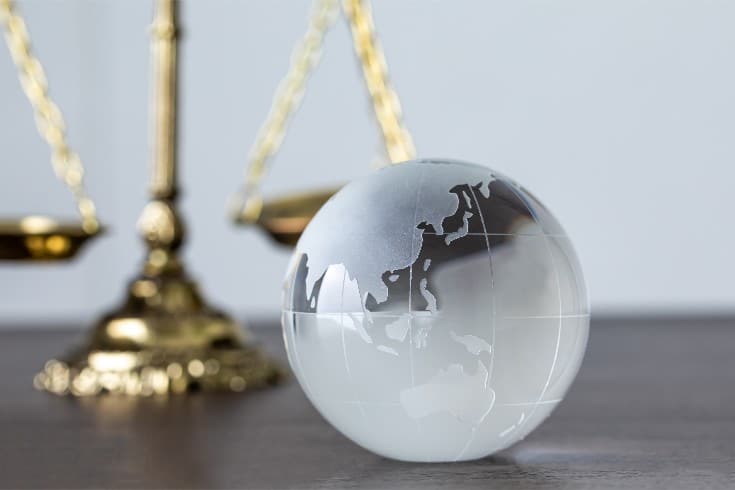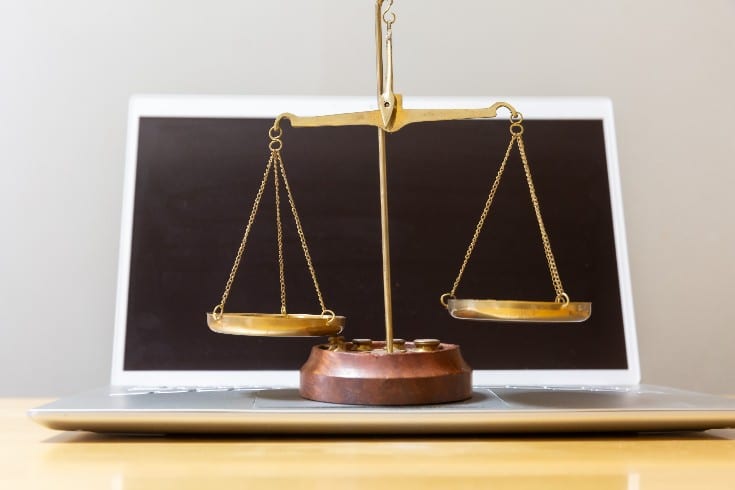Jurisdiction in International Litigation with Overseas Sites such as Facebook and Amazon

When requesting disclosure of sender information to identify the poster of a comment on the internet, the process typically involves first requesting the content service provider to disclose the IP address and timestamp. If this request is denied, the next step is to initiate a lawsuit. Additionally, if it is not possible to remove the post through out-of-court negotiations, it is conceivable to request the provider to remove the post through legal proceedings.
In the case of, for example, So-net, since So-net is a Japanese company and its headquarters is located in Shinagawa, Tokyo, you would initiate a lawsuit in the Tokyo District Court.
However, what should you do in the case of companies like Facebook or Amazon, which have their headquarters overseas?
Can a lawsuit be filed in a Japanese court if the defendant is a foreign company?
Jurisdiction is a part of the state power known as “judicial power,” and its exercise is premised on the range where the state’s power extends. This raises the question of whether Japan, as a state, can exert its judicial power over a foreign company located outside of Japan, in other words, whether it can summon the company to court as a party and compel it to comply with the judgment.
For instance, let’s say Bob, an American in New York, punches Catherine and injures her. Clearly, an American court would handle this case. A Japanese court would not have the jurisdiction to try this case. In incidents like “someone punched someone else,” there are rarely many issues about whether a Japanese court has jurisdiction. As in the example above, in most cases, it’s clear from common sense. However, in the case of the internet, there are commonly services operated by foreign corporations that are available in Japanese and have many Japanese users. Surprisingly, the question of “Should this case be handled in a Japanese court in the first place?” often arises.
This issue of whether a lawsuit against a foreign company (or individual) can be filed in a Japanese court, or in other words, which country’s court a lawsuit can be filed in, is referred to as “international jurisdiction.” Astonishingly, until recently, Japanese laws, including the Civil Procedure Law, did not explicitly stipulate jurisdiction over international incidents. It was only with the amendment to the Civil Procedure Law enacted on April 1, 2012 (Heisei 24), that provisions for international jurisdiction (Articles 3-2 to 12) were newly established and clearly stipulated.
Is it Possible to File a Lawsuit Against Facebook in a Japanese Court?

Facebook is currently the world’s largest social networking service (SNS), operated by Facebook, Inc., headquartered in Menlo Park, California, USA. According to Article 3-3 of the revised Japanese Civil Procedure Law, it states that “lawsuits listed in the following items can be filed in Japanese courts when stipulated in each item,” and item five mentions the following case.
Civil Procedure Law Article 3-3
Five: Lawsuits against those conducting business in Japan (including foreign companies continuously conducting transactions in Japan (referring to foreign companies defined in Article 2, Item 2 of the Company Law (Law No. 86 of 2005 (Heisei 17))).
When the lawsuit pertains to the business conducted by the party in Japan.
In other words, it is stipulated that if a foreign company is conducting business targeting Japan, jurisdiction is granted to Japanese courts when initiating a lawsuit related to the business conducted in Japan.
Facebook is a “Business Operator in Japan”
Based on this provision, since Facebook provides services in Japanese, it naturally targets users in Japan, and it can be determined that Facebook, Inc. is a “business operator in Japan”.
Therefore, if you request disclosure of sender information from Facebook, Inc. on the grounds that you were defamed on Facebook, it can be said that it falls under “matters related to the business conducted by the party in Japan”.
According to this provision, it has become possible to file a lawsuit in a Japanese court against Facebook, Inc. for a request to disclose sender information.
Facebook’s Terms of Use
Currently, the “Facebook Terms of Use” stipulates the following provision as “4. Additional Provisions” and item 4.
4. Disputes
Facebook Terms of Use[ja]
We want to limit or avoid claims between you and us by providing clear provisions. However, if a claim is made, it is beneficial to know in advance where it will be resolved and which law will apply.
If you are a consumer, any claim, lawsuit, or claim (“claim”) you make against us due to or related to this agreement or Facebook products can be resolved under the laws of your country of residence, and the claim can be resolved in the jurisdictional court of that claim in that country. In all other cases, you agree to resolve the claim exclusively in the United States, regardless of the provisions of conflict of laws, and that the claim will only be resolved in the Northern District of California Federal District Court or a state court located in San Mateo County, and that you will comply with the personal jurisdiction of either of these courts for the purpose of making a claim, and that this agreement and the claim will be governed by California law.
From this description, it is clear that it is possible to file a lawsuit against Facebook in a Japanese court.
Is it possible to sue Amazon in a Japanese court?
Amazon, the largest e-commerce site in Japan, is operated by Amazon Services LLC, a subsidiary of Amazon.com. Inc., which is headquartered in Seattle, Washington, USA. Amazon Services LLC is headquartered in Las Vegas, Nevada, USA, and the “contact point” in Japan was Amazon Japan. It was said that the Japanese corporation had nothing to do with the operation.
So, if you want to sue Amazon, for example, if your reputation has been damaged by an Amazon customer review, who should you sue and where should you file the lawsuit?
Is Amazon operated by a U.S. corporation or a domestic corporation?
On March 25, 2016 (Heisei 28), an interesting judgment was handed down in the Tokyo District Court.
In 2015, an anonymous user posted a “defamatory comment” in the book review section, and a non-profit organization in Tokyo sued Amazon Japan for disclosure of the poster’s information. The Tokyo District Court accepted the NPO’s argument and ordered Amazon Japan to disclose the reviewer’s IP address, name, address, and email address. As there was no appeal from Amazon Japan, the judgment became final on April 8.
In this lawsuit, Amazon Japan admitted that the Amazon site is managed by Amazon Japan, a Japanese corporation.
As a result, it is now possible to take action against Amazon Japan when seeking provisional measures or filing a lawsuit regarding Amazon reviews.
In the past, when dealing with Amazon’s U.S. corporation, there were many problems, such as the need for all documents submitted in court proceedings to be translated into English, the time it takes for delivery, and the difficulty in getting a court date. However, if you can proceed against a Japanese corporation, these problems will be solved, which is very convenient.
Also, on a regular review site, after requesting the disclosure of the IP address, you must request the disclosure of information such as name and address from the provider. However, Amazon, an online shopping site, already has not only the poster’s IP address but also their name, address, and email address. Due to the nature of product delivery, there is a high possibility that true information is entered for account information such as name and address, so you can save the procedure for identifying the poster. In this sense, this Tokyo District Court decision was of great significance.
Amazon’s Terms of Use
Furthermore, in the Amazon.co.jp Terms of Use updated on May 20, 2018 (Heisei 30), it states:
Welcome to Amazon.co.jp. Amazon Services LLC, a U.S. corporation, and/or its affiliates (collectively referred to as “Amazon”) provide services to you based on the following terms.
Amazon.co.jp Terms of Use [ja]
However, in the “Disputes” section, it states:
Disputes
Amazon.co.jp Terms of Use [ja]
In addition to the jurisdictional courts permitted by law, the Tokyo District Court will be an additional agreed jurisdictional court for disputes arising from or related to Amazon Services between Amazon and you. However, for business customers, you agree that the Tokyo District Court will be the exclusive agreed jurisdictional court of first instance.
From these terms, it can be confirmed that it is possible to sue Amazon in a Japanese court.
Expertise in Corporate Registration and Document Translation is Required
As such, even if the opposing party is a foreign corporation, there may be cases where jurisdiction is granted by Japanese courts.
However, litigation procedures against foreign corporations require a certain level of ‘expertise’. For example, in litigation, there is a rule that if the opposing party is a corporation, you must submit their registration. While it is easy to obtain registration for domestic corporations, it can be quite a challenge for foreign corporations. Also, when dealing with foreign corporations, there may be cases where you need to translate documents such as complaints and evidence. These procedures can be difficult in practice unless handled by a lawyer who has extensive experience in litigation procedures against foreign corporations.
While this article discusses Facebook and Amazon, our firm, for example, also has a track record in provisional dispositions against FC2.
https://monolith.law/reputation/delation-of-fc2posts[ja]
Even Foreign Corporations Can Be Sued in Japan
In today’s globalized internet society, many Japanese people are likely to use services operated by foreign corporations. If you want to delete an article or identify a poster, even if the other party is a foreign corporation, we recommend checking on international jurisdiction before giving up due to the hassle and cost.
Category: Internet





















